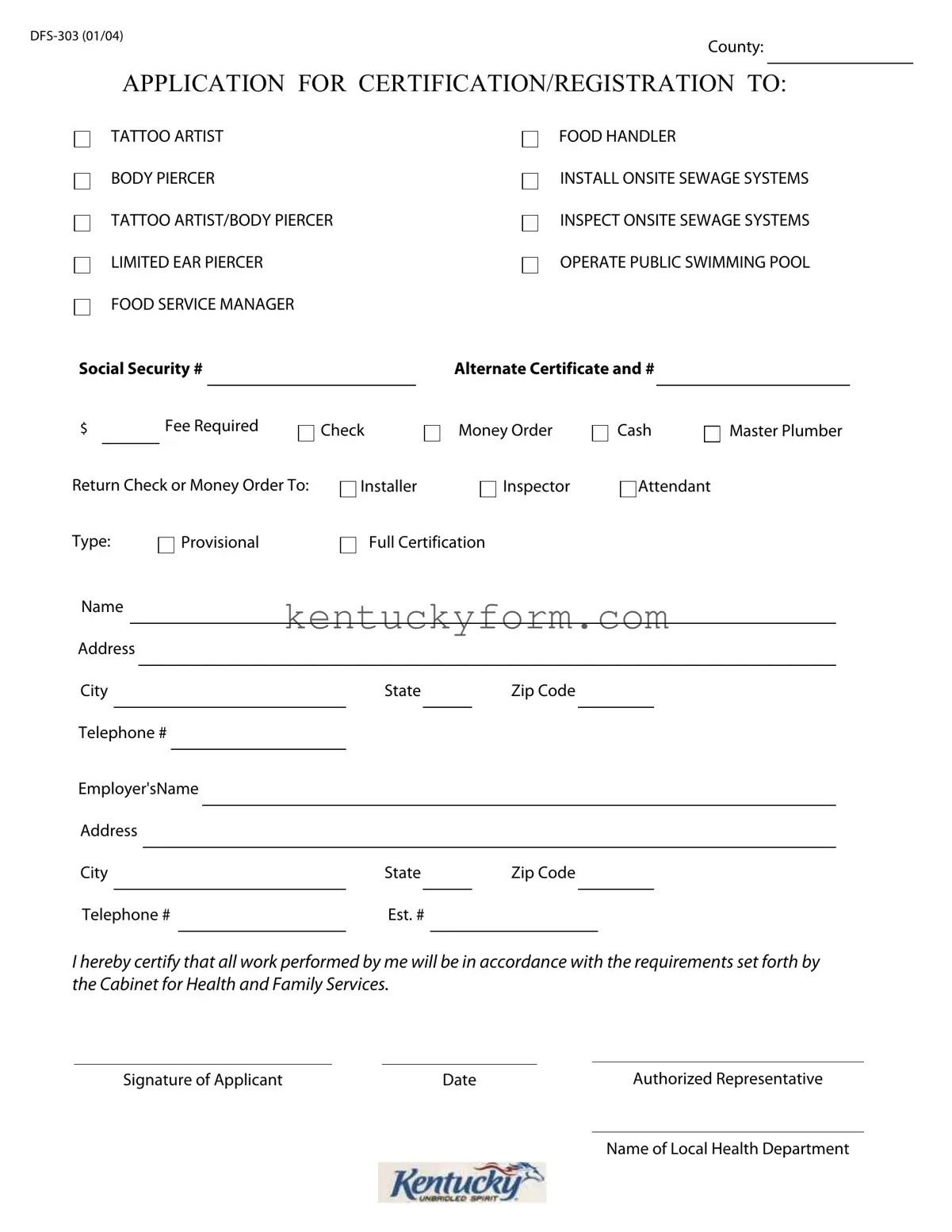The Form DFS-303 shares similarities with the Occupational License Application, as both are designed for professionals seeking official permission to engage in specific occupations. Both forms require applicants to provide personal and professional information, including their name, address, and employer details. They also necessitate the declaration of qualifications and compliance with relevant regulatory standards, underscoring the applicant's commitment to adhere to established industry or governmental requirements.
Similarly, the Food Handler's Permit Application aligns with the DFS-303 form in its focus on public health and safety. Each form serves as a gateway for individuals to demonstrate their understanding and commitment to adhere to health regulations within their respective fields. The detailed information requested about the applicant's background and their occupational specifics highlights the importance of maintaining high standards of hygiene and safety in the food service and body art industries.
The Master Plumber License Application parallels the DFS-303 form in terms of providing a structured pathway for skilled professionals to obtain the necessary credentials to practice their trade. Both forms necessitate the applicant's personal and professional information and evidence of competence, such as certifications or proof of apprenticeship. This process ensures that individuals are qualified and prepared to execute their duties following the latest standards and regulations.
The Body Art Practitioner Registration form is another document with similarities to the DFS-303. It specifically caters to professionals in the tattoo and body piercing industry, requiring detailed information about their skills, training, and compliance with health and safety protocols. Both forms serve to protect public health by ensuring practitioners are adequately prepared and committed to maintaining a safe environment for their services.
Public Swimming Pool Operator's Certificate Application shares objectives with the DFS-303 by aiming to certify individuals responsible for managing public swimming facilities. Each application requires comprehensive details about the applicant's ability to comply with health and safety standards, emphasizing the importance of certified management to ensure public spaces are safe and well-maintained.
The Septic System Installer Permit Application mirrors the DFS-303 in its requirement for specialists to demonstrate their qualifications and commitment to adhering to environmental and health standards. Both forms facilitate the certification of professionals who play critical roles in maintaining public health and environmental integrity through the proper installation and management of essential systems.
Similarly, the Septic System Inspector Certification form shares its objectives with the DFS-303 form by ensuring individuals entrusted with inspecting onsite sewage systems are qualified and knowledgeable. Personal and professional details, along with a declaration of adherence to regulatory standards, are vital in both forms, ensuring that only competent inspectors undertake these crucial health and environmental safeguarding roles.
The Limited Ear Piercer Application can be seen as a specialized subset of the DFS-303 form, specifically designed for professionals who focus exclusively on ear piercing. Both forms require applicants to provide evidence of training and understanding of health and safety protocols, underlining the importance of specialized certification in ensuring public safety and hygiene in niche areas of body art.
Food Service Manager Certification Application is likewise similar to the DFS-303, as it is aimed at individuals seeking to uphold food safety and hygiene standards in food service management roles. Each form gathers detailed personal and professional information to establish the applicant's qualifications and readiness to enforce health codes and manage food service operations effectively.
Finally, the Cash Handling Certification for Public Employees bears resemblance to the DFS-303 due to its background and fee requirements, albeit for a different professional setting. This form is essential for employees who manage monetary transactions in public service roles, ensuring they are trustworthy and competent. Like the DFS-303, it requires applicants to provide detailed information and affirm their dedication to adhering to established procedures and ethical standards.


